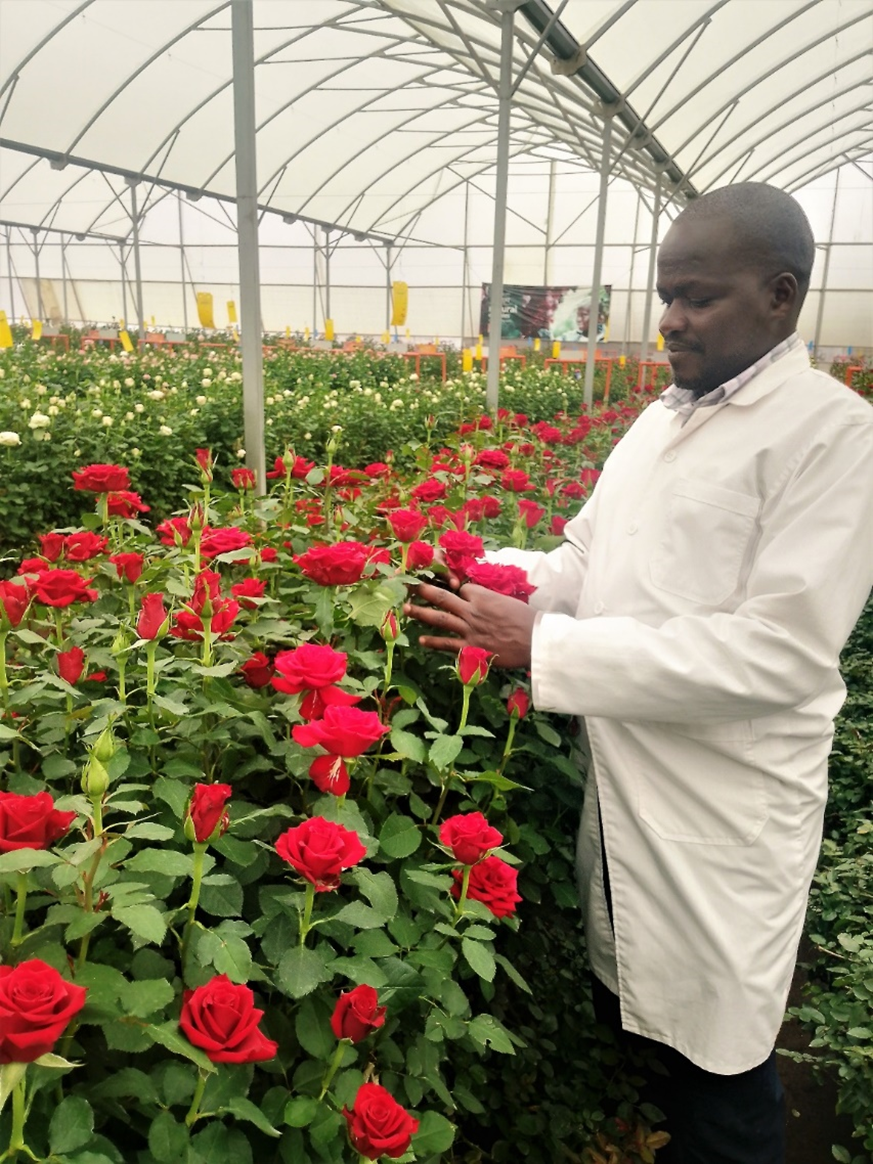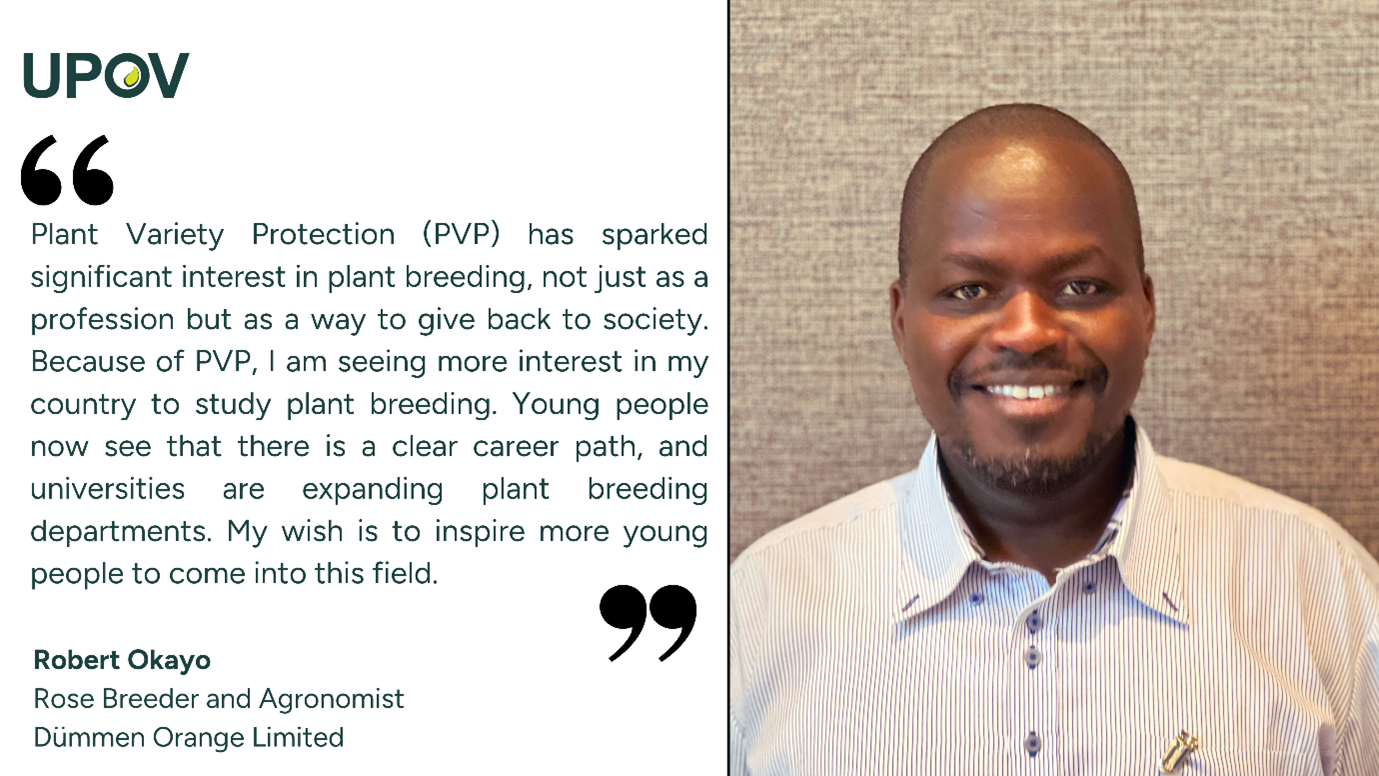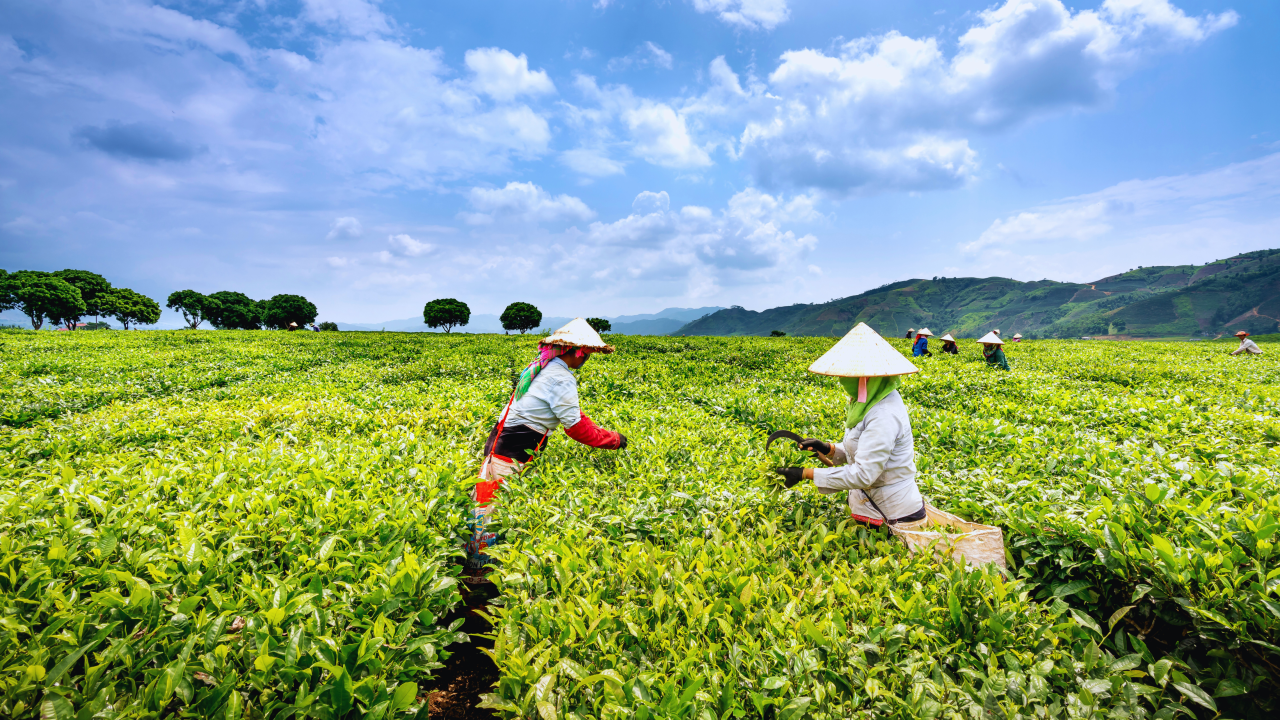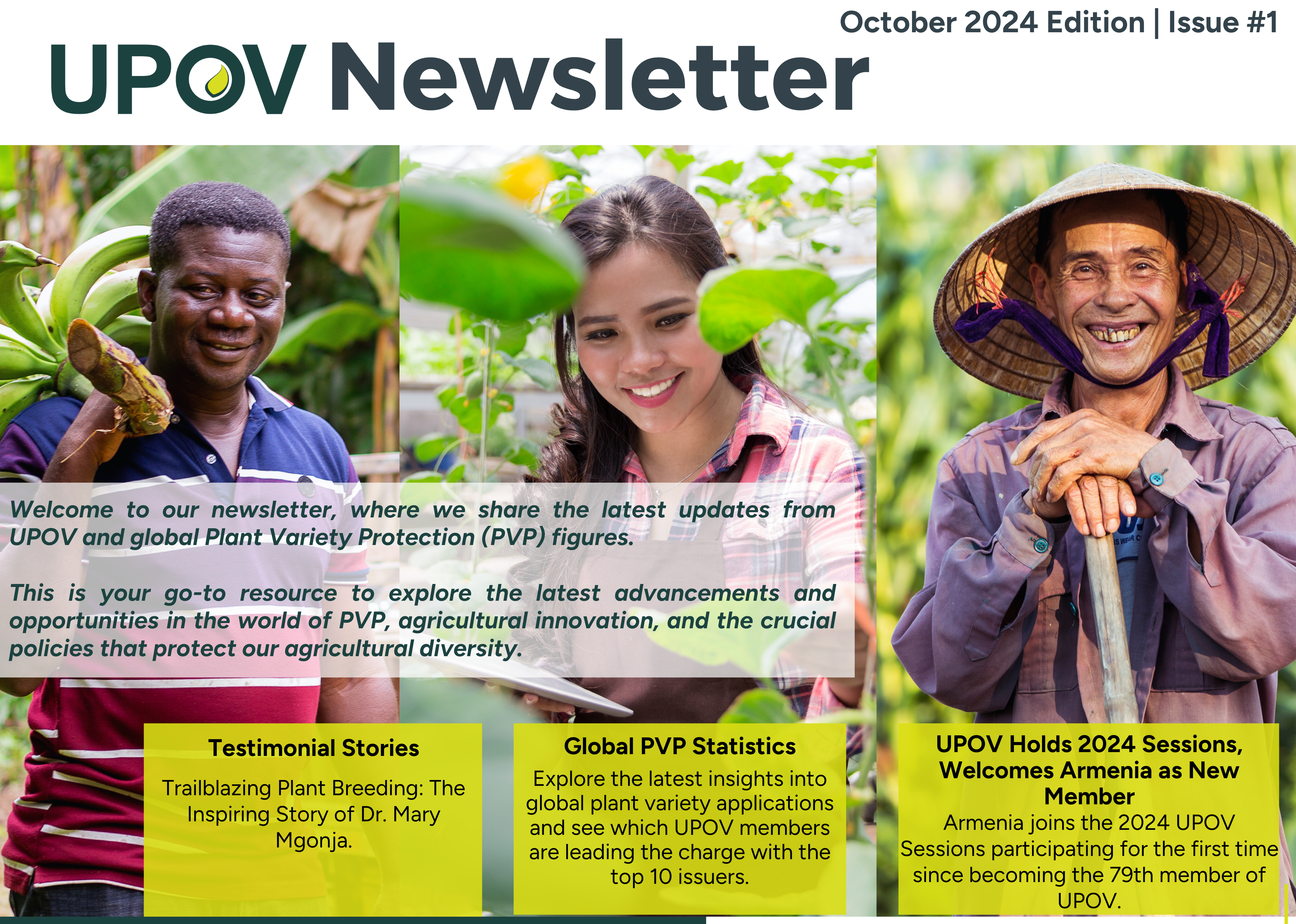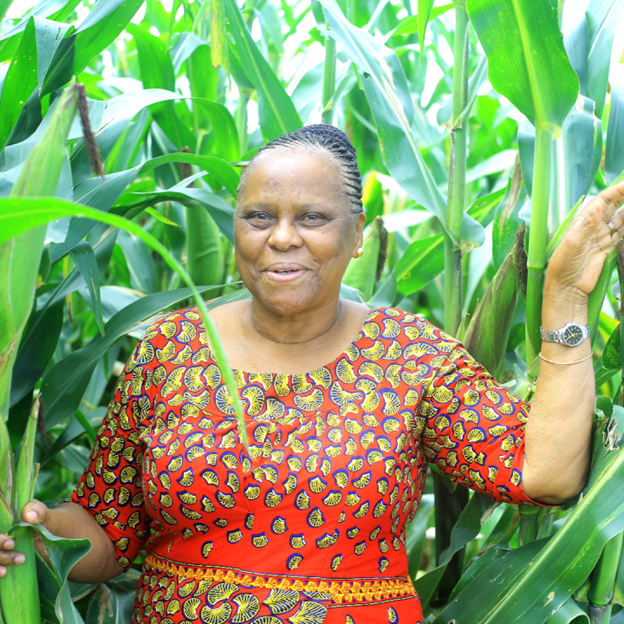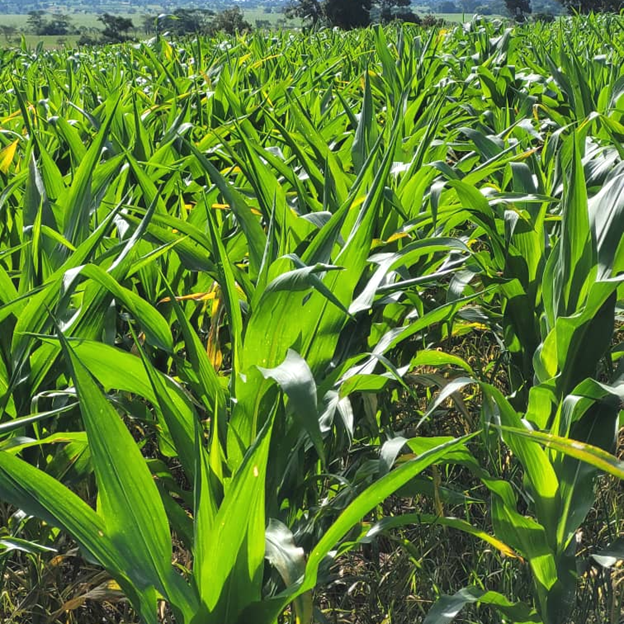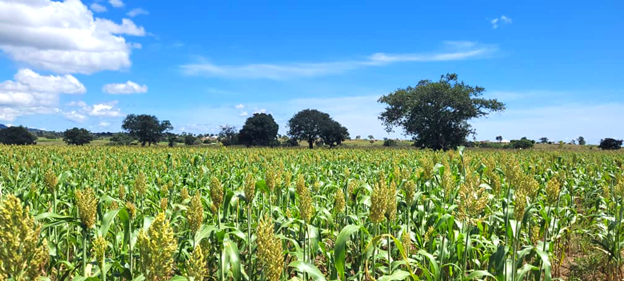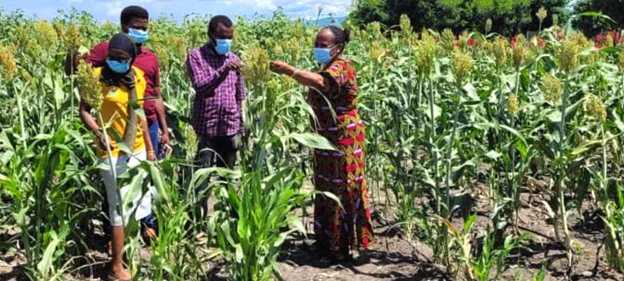Latest News
| Jun 30, 2025 | Robert Okayo: Championing Plant Breeding for Community Impact
In a small Kenyan village west of Nairobi, Robert Okayo’s journey began with humble roots in subsistence farming. By the age of six, he already knew he wanted to "bring science into what he saw his family and community were doing”. This perspective was sharpened when he entered university to study horticulture and agronomy, drawing inspiration from professors specializing in plant breeding and genetics. He was fascinated by their deep knowledge and practice of plant breeding and genetics to develop resilient crop varieties. This opened his eyes to plant breeding not just as a career, but as a tool to addressing broader socio-economic issues such as poverty alleviation and rural development.
Currently, Robert is a Rose breeder at Dümmen Orange Limited, a leading global breeder and propagator of ornamental flowers and plants. Previously, he worked as a Research Associate with the Consultative Group on International Agricultural Research (CGIAR) in Kenya within the global maize program, specializing in breeding for biotic stress. During his time at CGIAR, Robert contributed to research initiatives focused on developing stress-tolerant maize varieties against diseases such as Maize Lethal Necrosis (MLN), Turcicum Leaf Blight, Gray Leaf Spot and Fusarium Ear Rot Disease and pests such as Fall Army Warm and Stem Borers in Sub-Sahara Africa. He also participated in the development of high-throughput phenotyping protocol for MLN screening in quarantine stations. These improved maize varieties significantly, boosted yields, benefiting both commercial and subsistence farmers across Sub-Sahara Africa. "The main benefit of these new maize varieties is increased productivity. Farmers can now harvest more from a smaller area, especially with hybrid maize, which marks a significant improvement in their performance. By adopting these hybrids, they can achieve higher yields within a shorter cropping period, unlike older varieties that struggled with drought and low productivity in the face of climate change." he stated. Beyond productivity, UPOV’s system of plant variety protection (PVP) has also played a crucial role in fostering interest and growth in plant breeding. According to Robert, an effective PVP framework encourages innovation, enabling breeders to develop resilient, high-yielding crops that benefit farmers and enhance food security. "PVP has sparked significant interest in plant breeding, not just as a profession but as a way to give back to society. Because of PVP, I am seeing more interest in my country to study plant breeding. Young people now see that there is a clear career path, and universities are expanding plant breeding departments. My wish is to inspire more young people to come into this field." Robert shares while sporting a sheepish grin.
In addition to the career prospects, plant variety protection is helping to improve food security and agricultural resilience. As a result of the growing demand for improved varieties, there are now more plant breeders and stronger breeding initiatives. “The community recognized the advantages of using elite crop varieties that are adapted to local conditions, resilient to pests and diseases, and more nutritious. This realization strengthened breeding efforts aimed at meeting these specific needs,” Robert explains. He also reckons that plant variety protection has led to broader societal benefits. “In regions where new crop varieties are developed and adopted, communities have experienced increased employment opportunities, improved road infrastructure, and support for social initiatives. A good example is the Naivasha region in Kenya, where flower breeding and cultivation have created numerous jobs, enhanced access roads, and supported community projects, such as funding for local football clubs.” He shares. As one of the world’s leading exporters of rose flowers, Kenya’s floriculture industry is a significant contributor to its economy with roses comprising approximately 66% of the country's cut flower exports, research by the Kenyan National Bureau of Statistics cites. In 2024, Kenya's total flower exports reached $USD 835 million. "Over time, I see the farms being run by local people. A good example is the farm where I work today—we only have one external person. The rest of the departments, including the breeding department that I am heading, are all local. Flower breeding here before was done by experts from Europe, but now, we are coming in. We are improving, and I see more young graduates becoming interested ." Robert said. The export of plant breeding innovations from Kenya happens through a variety of channels, including the sale of improved seeds and crop varieties, licensing technologies, international collaborations, and agricultural exports. Growing local participation in breeding programs signals a new era of innovation, with experts paving the way for a more sustainable and diversified agricultural future. Building on this momentum, Robert—a passionate advocate for education and youth—actively mentors young agronomists and budding plant breeders, breaking down complex concepts and igniting enthusiasm for the field. He believes that making agricultural careers more appealing is essential, especially in Africa, where food security remains a pressing challenge. By investing in knowledge and talent, Robert and his team are ensuring that the future of agriculture is not only resilient but drive by homegrown expertise and innovation. |
| Jun 24, 2025 | UPOV Newsletter June 2025 Edition: Subscribe, Stay Informed, Stay Connected!
Image: Quang Nguyen Vinh from Pexels We are pleased to announce the latest edition of the UPOV Newsletter – a fresh way to stay informed about the latest developments in plant variety protection. Each edition will feature:
Whether you're involved in policy, research, agriculture, variety development or commercialization, we invite you to join our growing community of readers. Click the link here to subscribe now and be part of the conversation: https://www.linkedin.com/pulse/upov-newsletter-june-2025-edition-upov-official-ijiae
|
| Oct 25, 2024 | UPOV Newsletter (October 2024) |
| Sep 16, 2024 | Braving the Odds: Dr. Mary Mgonja's Journey to Empower Smallholder Farmers in Tanzania Through Plant Breeding
Dr. Mary Mgonja In the Same district of Tanzania’s Kilimanjaro region, where Africa's highest peak- Mount Kilimanjaro rises, is the birthplace of Dr. Mary Mgonja—a renowned Tanzanian agricultural scientist, plant breeder, and founder of Namburi, a private agricultural enterprise. Growing up in the shadow of this majestic peak, Dr. Mgonja considered her dreams to be as lofty as the mountain itself- if not even higher. At an early age, she was determined to excel in a field viewed as challenging, particularly for women. "I didn't want to pursue something considered easy or simple. There's a saying that women have to work twice as hard to be seen as half as good. So, I chose plant breeding and genetics—the most challenging fields in agriculture—because I knew I was capable of excelling, no matter how difficult the path." - Mary Mgonja And that’s exactly what she did. Her academic excellence got her into a PhD in plant breeding and genetics. She later held senior roles at the International Crops Research Institute for the Semi-Arid Tropics (ICRISAT), the Alliance for Green Revolution in Africa- AGRA, and Tanzania's Ministry of Agriculture, focusing on agricultural transformation, supporting smallholder farmers, and enhancing food security through the breeding of maize and sorghum varieties for Eastern and Southern Africa- crops which are essential in this region. Dr. Mgonja has been a vocal advocate for plant breeding and plant variety protection, highlighting its importance for both breeders and farmers. Improved plant varieties lead to higher yields, better resistance to pests and diseases, and greater resilience to environmental stresses such as drought. These advancements are crucial, especially in countries like the United Republic of Tanzania, where agriculture is the backbone of the economy and the primary source of livelihood for much of the population. Plant variety protection upholds breeders' rights, fostering innovation and investment in new crop varieties, benefiting breeders with more options and profits, while providing farmers access to high-quality seeds to boost productivity. The United Republic of Tanzania joined the International Union for the Protection of New Varieties of Plants (UPOV) in 2015, aligning its Plant Breeders’ Rights Act with UPOV's 1991 Convention. This legal protection for plant breeders promotes resilient crops, boosts profits, and enhances food security and productivity. Dr. Mgonja highlighted a success story of licensing public-sector maize hybrids, which allowed her company- Namburi to produce high-quality, affordable seeds, making improved hybrids more accessible to farmers. “Because the seed production is being done in the country, this hybrid seed is half the price of others being imported. Our selling price is $2, per kg, while the others are being sold at $3 or $3.5. This is the impact of having this variety being protected and licensed to local seed companies. Most of these local seed companies do not have varieties of their own, so they can access these varieties through licensing.”
Dr. Mary Mgonja’s maize farmlands Her maize hybrids – protected varieties licensed through public-private partnerships - have been a game-changer, and are used by over 15,000 farmers, spanning over 30,000 acres of farmlands. These hybrids have led to significant increases in productivity, directly contributing to improved food security and economic stability for thousands of families. She also developed drought-tolerant sorghum hybrids, reaching 23,000 farmers and offering a climate-smart solution against climate change. Her protected sorghum varieties have also been valuable to the brewing industry, benefiting 8,000 smallholder farmers through guaranteed commercialization of their harvests.
Dr. Mary Mgonja’s sorghum farmlands "Plant variety protection helps me ensure that farmers I’m working with receive the authentic varieties they pay for, safeguarding them from counterfeit seeds. This protection not only preserves the integrity of my work but also guarantees that farmers benefit from the high-quality, resilient crops they rely on."- she shared. Central to Mary's plant breeding approach is understanding farmers’ needs and market demand, while ensuring crop varieties meet both agricultural and industry requirements. Her partnerships have enabled more than 40 demonstration fields to be established in different regions of the country for farmers to see and learn how her varieties perform. Today, Namburi produces 300 metric tons of maize seed annually, reaching 15,000 farmers, and 50 tons of sorghum seed benefiting 23,000 farmers, including farmers contracted for certified seed production.
Mary speaking to some of her farmers Her vision is to expand her business further and train smallholder farmers to utilize improved varieties for the evolving market. Dr. Mgonja's journey in plant breeding demonstrates perseverance, the power of education, and the impact one person can have on an industry. Her work has empowered Tanzanian smallholder farmers, set standards for innovation, and continues to transform the country’s agricultural landscape, securing a brighter future. |
| Apr 29, 2024 | Launch of the UPOV International Certificate on Plant Variety Protection
The Office of the International Union for the Protection of New Varieties of Plants (UPOV) is pleased to announce the launch of the UPOV International Certificate on Plant Variety Protection (UPOV PVP Certificate). UPOV has launched the UPOV PVP Certificate program to promote the acquisition of knowledge and recognition of expertise, as well as opportunities for continuous learning on PVP matters, connecting peers and creating expert networks.
Why a UPOV PVP Certificate? The UPOV PVP Certificate provides international recognition of knowledge and expertise in PVP matters. Holders of the UPOV PVP Certificate demonstrate to have followed a certain number of courses and contributed to activities concerning the UPOV Convention and its guidance, operation of a PVP Office and examination of applications, including DUS examination. Who can obtain a UPOV PVP Certificate? Participation to the UPOV PVP Certificate program is open for government officials from UPOV members and observers (see list of UPOV members: https://www.upov.int/edocs/pubdocs/en/upov_pub_423.pdf; and observers: https://www.upov.int/members/en/observers.html). Participants from the private sector will be welcome, subject to fee payment, in the next release of the program planned for 2025. How does it work? The UPOV PVP Certificate will be awarded for persons that acquire at least 50 credits from UPOV-endorsed training. The list of endorsed training of the UPOV PVP Certificate program and application form is provided at the UPOV PVP Certificate webpage. UPOV members providing training on plant variety protection are invited to join the UPOV PVP Certificate program The UPOV PVP Certificate program was established to support UPOV members providing training on plant variety protection. If you are an authority, organization or academic entity in a UPOV member providing training on plant variety protection, you are invited to propose its inclusion in the UPOV PVP Certificate program. Please contact the UPOV Office for further information at upov.mail@upov.int |
